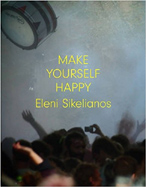
 |
 |
|
Review by Casey L. Williams
Make Yourself Happy by Eleni Sikelianos Coffee House Press February, 2017. Paperback. ISBN: 978-1566894593 |
 |
| "What is happiness?"—it's a question that constantly surfaces when we think about our creations, livelihoods, and dreams. Many people have attempted to tackle this infamous question, but never in a way like Eleni Sikelianos has in her most recent collection of poetry, Make Yourself Happy. Through her dynamic writing, Sikelianos transcends both time and space in order to not only grapple with happiness, but to understand what exactly it is (or isn't) that makes ourselves happy. |  |
|
The collection is divided into four parts—Make Yourself Happy; How to Assemble the Animal Globe; Oracle Or, Utopia; and Epode & There Were Ancient Questions Inside My Head—that examine different conceptions of happiness. The first section brims with stereotypical images of what we believe to embody happiness, such as breakfast in Paris, a bird song, and surfing social media. Later sections continue this trend, but through more indirect methods—hopping back and forth through time, Sikelianos uses the voices of the deceased and the unborn to prod at happiness. In the section Make Yourself Happy, Sikelianos plays with the romanticized view of happiness. To accomplish this, she allows reality to speak for itself. The once beautiful French café now lives in the world of the poem "In a Café." Here, everything is "leafless and grey with frozen flaques on which to slip and bust your ass." With the poem "Making the Bird Happy," the narrator concludes that birds are where "I keep applying what I think I know" about happiness. As for technology, the platform is warped to present happiness as something that can easily be quantified; as the poem "Table 1" reveals, this yearning to simplify happiness merely allows one to own "the same face" as suffering. In How to Assemble the Animal Globe, the pages transform into memorials dedicated to extinct species from all continents. Through references to human behavior and the pursuit of wealth and power, the reader is inherently shown the effects of society's vision of happiness. During all of this, the style deviates from the first section: poetry that had once bristled with energy now stands as epitaphs to the lost, the words disposed to whisper rather than sing. The poetry eventually flashes forward to Oracle Or, Utopia, home to a dystopian future. The poetry recounts the future of humanity, which is relegated to the confines of the Oracle, a dwelling meant to mimic the natural world. As the section continues, this seemingly utopian environment falls victim to the instability that had been brewing in the previous sections: the poetry begins to corrupt, words lose meaning and verses degrade, as if the poetry itself is experiencing the "unragging" of its "telomeres," then the "quiet" of self-destruction. In the final section, Epode & There Were Ancient Questions Inside My Head, the collection reaches its peak, but as with poetry and life itself there are no simple answers or solutions: there is no checklist or batch of items necessary to achieve happiness, nor can the poetry itself even answer. The poetry instead leaves us to stand before the mirror of ourselves, to press our foreheads to the cool glass and to "look un-inveigling" at our reflections. "What is happiness?" the reader asks—"face the mirror and see," replies Make Yourself Happy. |
 |